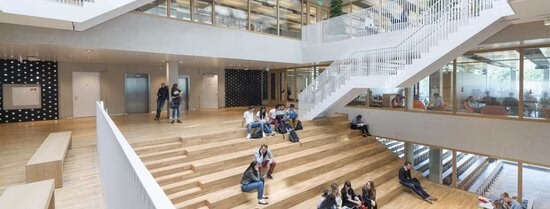If we are here as a university to make societal impact, we should all engage in open science. This is what the Open Science Community Rotterdam (OSCR) is pursuing. Dr. Antonio Schettino, Senior Advisor Open Science at Erasmus Research Services (ERS) and OSCR founder, explains what the community does and why it is important for all, also outside the academic community. “We need to bring down the idea of the lone, superstar scientist, because nobody works alone.”
Open science is a set of principles and tools that aim to open up research information and increase participation in research throughout society. A good example is the ‘We Spark the World’ collective by neuroscience researchers Lysanne te Brinke and Fabienne van Rossenberg, which develops gratitude challenges for young people, both online and in the classroom.
At Erasmus University Rotterdam several people were already practicing open science. They are now connected in the Open Science Community Rotterdam (OSCR), founded by Dr. Antonio Schettino in 2019. The first community started at Utrecht University, was later adopted in Rotterdam and other universities in the Netherlands, and is now expanding worldwide. Antonio: “We welcome everyone who wants to know more about open science, and also those who criticize it.”
Closed science?
When asked about ‘closed science’, he answers: “An easy example is publications. Very often research is done with tax money, a paper is written about the results, sent to a journal and, if it’s good enough, published. But it then appears behind a paywall, and ordinary citizens cannot access it while, in the end, they paid for it.”
Build research on someone else’s data
“This is similar for data. In research a lot of valuable datasets are created. Sometimes they cannot be shared because of confidentiality. But often data can be anonymized, after which they can be shared with others. This is very useful because others can build their research upon it without having to collect a whole extra set of data. Furthermore, by sharing data, others can verify the results of the initial research”, says Antonio. Another option is to create synthetic data, which are similar to real data but computer-generated. Data scientist Dominique van Deursen of Erasmus University did this with the Student Data Simulation Dataset.
Lone superstar scientists do not exist
There are various reasons to change these practices. “Sharing research information responsibly accelerates discovery, which benefits everyone in society. Another important aspect is to increase the visibility and recognition of team science, to avoid that only a small number of individuals get all the credit and funding. We need to bring down the idea of the lone, superstar scientist, because nobody works alone.”
Recognition & Rewards
Practicing open science intersects with the idea of Recognition & Rewards, which puts less emphasis on quantitative indicators (such as the number of publications) and more focus on performance in other core areas such as education, social impact, leadership, and, in the case of University Medical Centres, also patient care. Antonio: “Open science could also be a solution for the braindrain of young scientists who leave academia because of the toxic ‘publish or perish’ culture.”
Bottom-up reform and training
How can OSCR contribute to the transition to open science? “The community can create a bottom-up critical mass of researchers and support staff that expect higher standards of research and push for policy reforms within the university. But it’s not enough, we need good infrastructure that is open and sustainable. We should avoid relying exclusively on proprietary infrastructure.”
OSCR also focuses on training researchers, staff, and students by organizing presentations, workshops, and journal clubs. In addition, a team composed by ERIM and ERS employees is currently developing a Massive Online Open Course (MOOC) on Open Science, which will soon be launched on Coursera. “We will add modules for support staff as well, because it is also important that a data steward or a legal advisor knows about open science.” A whitepaper describing what open science means at out university is also in preparation, in the context of the Open and Responsible Science Strategy program. And finally, in November three awards will be handed out to projects that make use of open science practices.
Society benefitting from science
In the end, it all revolves about society as a whole benefitting from academic research. According to Antonio, next to the acceleration of innovation, open science can also contribute to the connection and value to society for those research topics that are otherwise hard to relate to. Take for example the historical research done by Alex van Stipriaan about Rotterdam’s past of Slavery, which eventually led to apologies by Mayor Aboutaleb. “It is important that universities remember that they have to give back to society on different levels.”

